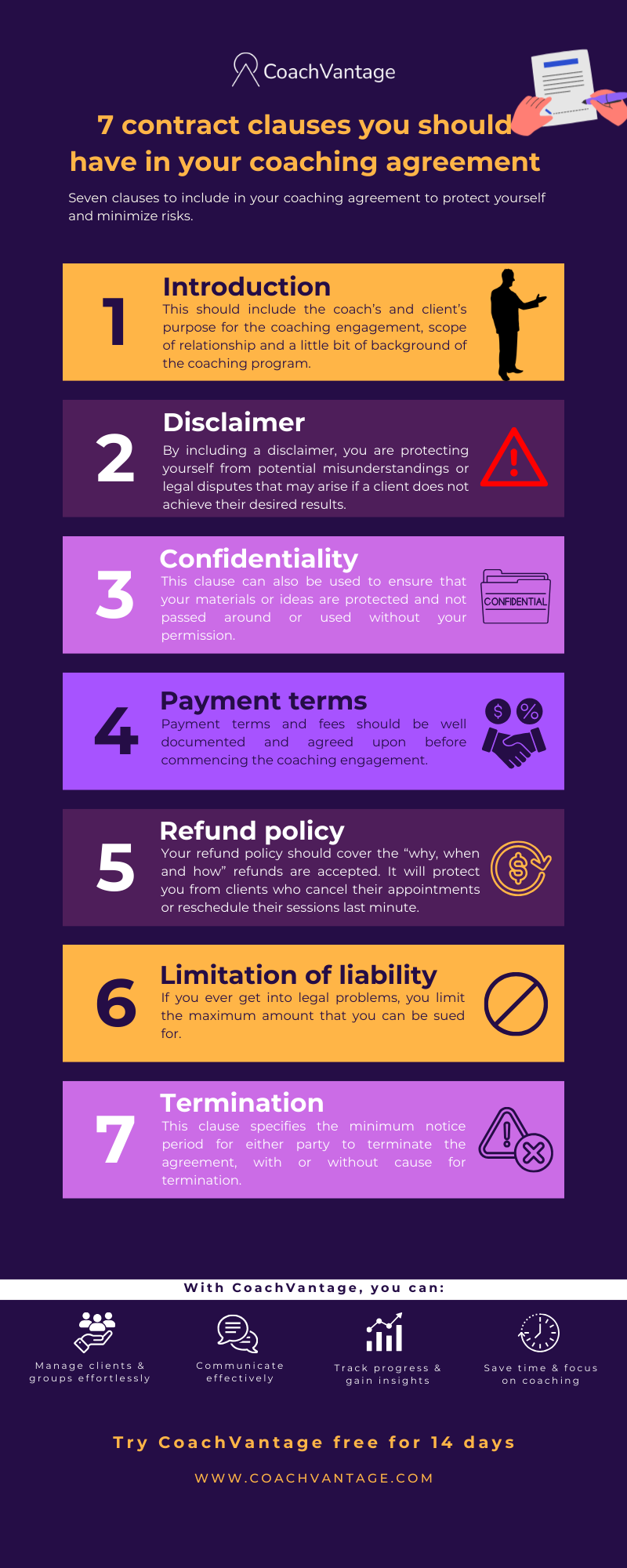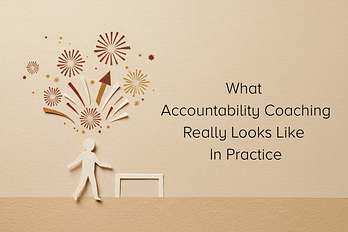December 12, 2022 - Coaching Business
7 contract clauses you should have in your coaching agreement
Seven clauses to include in your coaching agreement to protect yourself and minimize risks.

WHY DO YOU NEED A COACHING AGREEMENT?
The International Coaching Federation (ICF) has produced a code of ethics to abide by as a guideline. Under the ethical standards of ICF’s Code of Ethics, one of the requirements is:
“As an ICF Professional,I should create an agreement/contract regarding the roles, responsibilities and rights of all parties involved with my Client(s) and Sponsor(s) prior to the commencement of services..”
By definition, a coaching agreement is a legal agreement that sets the tone in a coach and client relationship.
A coaching agreement sets boundaries and minimizes common problems like clients re-scheduling sessions at the very last minute, or requesting refunds long after the refund period has expired.
A well-drafted coaching contract not only protects you legally, but also helps to manage the expectation of your clients.
It serves as the primary point of reference for any disagreements or potential lawsuits, in case anything goes south in your client engagements.
.png)
An article by Lumiacoaching.com, in collaboration with Valerie Del Grosso, an attorney who specializes in working with life coaching businesses and is the creator of The Coaches Legal Library, states that:
“Most coaching contract disputes are not about the amount paid for the service. Instead, disputes are usually over the finer points, such as:
1. The client repeatedly cancels 5 minutes before their scheduled sessions.
You blocked off time for them on your calendar in good faith, but they don’t think it’s fair to be charged for a no-show.
2. The client ‘disappears’ for 2 years, then re-emerges.
They now want the rest of their unused sessions, but you are no longer offering the service.
3. A client goes through your entire coaching program, then tells you at the end that they are not satisfied and want a full refund.
4. A client gets inspired by what they learn in your coaching program.
So much so that they decide to go into the same line of business as you… using the materials and knowledge they received from YOU! Your former client is now building a business based on your intellectual property, and is operating in direct competition with you.”
THREE BENEFITS OF A COACHING AGREEMENT
Besides protecting and minimizing business risk, a coaching agreement also helps in the following ways:
Coaching agreements direct the overall coaching engagement
In a Forbes article, it is mentioned that coaching engagements require an end-to-end engagement that are strategic and tactical.
Strategic agreements focus on the objectives and measures of success for the entire engagement and may involve commitments with the client and his or her employing organization.
Tactical agreements, in contrast, address coaching fees, schedules, logistics, communication between sessions, etc. Importantly, agreements about what coaching is (and is not) should be addressed early in the engagement and as often as needed. This is where important distinctions are made between coaches and mentors, consultants, therapists, trainers and other helping professionals.
Coaching agreements helps client and coach structure conversation
According to Solutionsacademy.com, a coaching agreement creates clarity on what the conversation is about, what the client would like to achieve, what is important to him or her about the topic and what the client would like to talk about.
When a different topic appears in the coaching conversation, both client and coach can check whether they are still on track, whether the new topic is more important than the old and which topic to pursue.
Coaching agreements help clients to have greater trust in their coach
Farscapedevelopment.co.uk stated that, in order for a coachee to speak openly and honestly with their coach they must absolutely trust that the information they give will not only be treated confidentially, but with empathy, sensitivity and respect. Contracting enables this trust to be built before the coaching begins.
SEVEN CLAUSES YOU SHOULD INCLUDE IN YOUR COACHING AGREEMENT
Depending on what type of coaching services you provide, you may need specific inclusions or clauses in your coaching agreement.
Listed below are seven general clauses that you should include, at a minimum, to protect yourself and minimize business risks:
1. Introduction
This should include the coach’s and client’s purpose for the coaching engagement, scope of relationship and a little bit of background of the coaching program.
Manage Your Coaching Practice in One Place
CoachVantage automates your business workflows so you can focus on impactful coaching results.
2. Disclaimer
According to Performancecoachuniversity.com, a coach's track record may include first hand examples of breakthroughs and successes. But, clients need to keep in mind that the methods a coach uses successfully with other clients may not necessarily result in the same level of success for them.
Outcomes are also dependent on client actions, decisions and choices.
Your disclaimer clause should clearly explain this. It helps set expectations that you are not responsible for a client’s actions or lack thereof.
3. Confidentiality
When you enter into a coach and client relationship, personal information is usually exchanged. This may include coaching materials that you have designed by yourself or your trade secrets.
This clause can also be used to ensure that your materials or ideas are protected and not passed around or used without your permission. In the case that this happens, it will result in a loss of potential income.
It should also spell out very clearly to your clients about how their personal data will be used and their rights relating to the access and use of their personal data.
4. Payment terms
Ah yes.. the bane of many coaches: chasing clients for payments.
Payment terms and fees should be well documented and agreed upon before commencing the coaching engagement.
According to Lovelyimpact.com, your payment plan should include details about when a client needs to make payment(s), and the total expected costs they will incur. This ensures full transparency and should leave no room for misinterpretations or misunderstandings.
In this clause, be sure to include what happens if they fail to fulfill the payment terms. Detail any late fees/penalty charges so they are fully aware and everything is spelt out clearly in your coaching agreement.
5. Refund policy
Your refund policy should cover the “why, when and how” refunds are accepted. A solid refund policy will protect you from clients who cancel their appointments or try to reschedule their sessions last minute.
6. Limitation of liability
A limited liability means that if you ever get into legal problems, you limit the maximum amount that you can be sued for. Typically, the limit is set at the fees that have been paid by the client under the agreement.
7. Termination
This clause specifies the minimum notice period for either party to terminate the agreement, with or without cause for termination.
It should also provide details about early termination fees or the expected compensation for premature termination.
It is always a good idea to have a contract lawyer review or draft your contract. If you need a sample version of a coaching agreement, you can take a look at the ICF’s sample HERE.
E-SIGN YOUR COACHING CONTRACT
A coaching agreement helps you set clear boundaries for yourself, protects your business and protects your clients’ interests too.
Digitalization has made it even easier and more convenient for contracts to be executed and signed by the contracting parties. There’s no need to go through the cumbersome process of sending contracts in hard copy for physical signature. In fact, you don’t even need to send contract documents as email attachments, print, sign, scan and send back again to the other party via email.
The legislation of e-signature contracts as legally binding documents in many countries such as the USA (Electronic Signatures in Global and National Commerce Act), Canada, Australia, the UK, the EU and many others, has given businesses and consumers confidence in executing digitally signed contracts.
CoachVantage is a coaching platform that makes it easy for you and your coaching clients to sign your coaching agreement with our contract e-sign feature.
We’ve also gone a step further by enabling you to embed your coaching contract in your coaching program sign-up process. It provides a seamless client acquisition and onboarding process that demonstrates professionalism.
Try this feature now by signing up for a free trial now and see how convenient the whole workflow is for both you and your clients.
Want More Coaching Clients?

Get Your Free Guide to Create An Irresistible Lead Magnet
And attract clients who want to work with you.
Get Your Free Guide Now
Glen Oliveiro
Founder of CoachVantage
With a pulse on the coaching industry, Glen personally engaged with hundreds of coaches to develop a platform that addresses their day-to-day challenges. A visionary entrepreneur, Glen is committed to revolutionizing coaching practices through the innovative solutions offered by CoachVantage.
https://www.coachvantage.comYou might also like...

How To Choose Your Life Coaching Niche

What Accountability Coaching Really Looks Like In Practice






